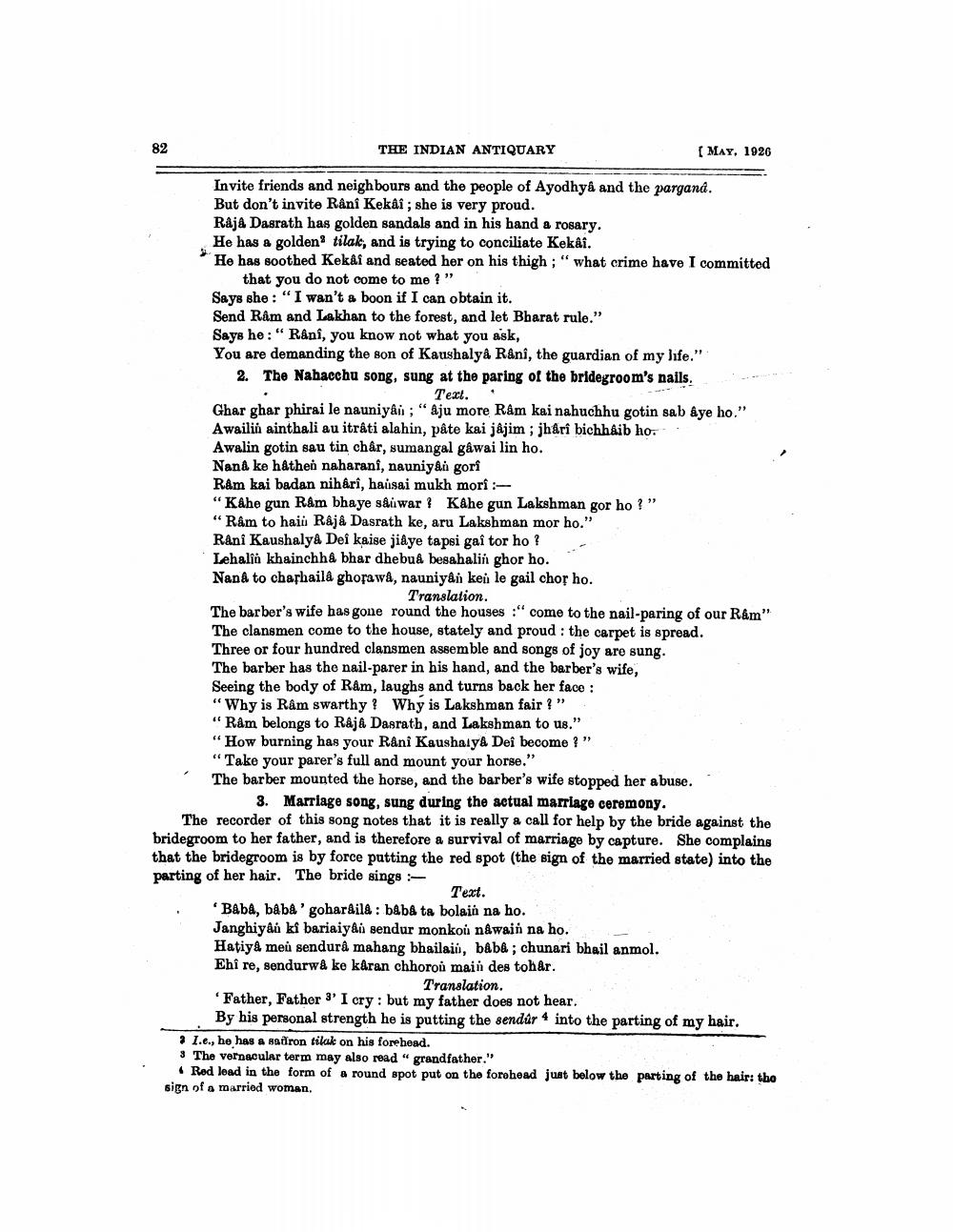________________
THE INDIAN ANTIQUARY
(MAY, 1926
Invite friends and neighbours and the people of Ayodhya and the pargana. But don't invite Rani Kekai ; she is very proud. Raja Dasrath has golden sandals and in his hand a rosary. He has a golden tilak, and is trying to conciliate Kekai. He has soothed Kekai and seated her on his thigh ; " what crime have I committed
that you do not come to me?" Says she : "I wan't a boon if I can obtain it. Send Ram and Lakhan to the forest, and let Bharat rule." Says he: "Râni, you know not what you ask, You are demanding the son of Kaushalya Rani, the guardian of my life." 2. The Nabacchu song, sung at the paring of the bridegroom's nails.
Text. Ghar ghar phirai le nauniyai ; "aju more Ram kai nahuchhu gotin sab dye ho." Awailin aintbali au itrati alahin, pâte kai jäjim ; jhari bichhaib ho. Awalin gotin sau tin châr, sumangal gawai lin ho. Nand ke h&then naharani, nauniyai gorî Ram kai badan nih kri, hausai mukh mori - "Kahe gun R&m bhaye sâuwar? Kahe gun Lakshman gor ho ?” "RÂm to haii Raja Dasrath ke, aru Lakshman mor ho." Rani Kaushalya Dei kaise jiâye tapsi gai tor ho ? Lehalsó khainchha bhar dhebuå besahalin ghor ho. Nana to chaşhaila ghorawâ, nauniyan kell le gail chor ho.
Translation The barber's wife has gone round the houses :" come to the nail-paring of our R&m" The clansmen come to the house, stately and proud : the carpet is spread. Three or four hundred clansmen assemble and songs of joy are sung. The barber has the nail-parer in his hand, and the barber's wife, Seeing the body of Ram, laughs and turns back her face : "Why is Râm swarthy? Why is Lakshman fair?" "Râm belongs to Raja Dasrath, and Lakshman to us." "How burning has your Rani Kaushalya Dei become ?" "Take your parer's full and mount your horse." The barber mounted the horse, and the barber's wife stopped her abuse.
3. Marriage song, sung during the actual marriage ceremony. The recorder of this song notes that it is really a call for help by the bride against the bridegroom to her father, and is therefore a survival of marriage by capture. She complains that the bridegroom is by force putting the red spot (the sign of the married state) into the parting of her hair. The bride sings -
Text. Baba, baba' gohardil& : baba ta bolain na ho. Janghiyâs ki bariaiydi sendur monkoú nawain na ho. Hatiyê meú sendurå mahang bhailain, babQ; chunari bhail anmol. Ehi re, sendurwa ke karan chhoron main des tohar.
Translation. Father, Father 3' I cry : but my father does not hear.
By his personal strength he is putting the sendar 4 into the parting of my hair. 3 I.e., he has a sadron tilak on his forehead. 3 The vernacular term may also read" grandfather."
Red lead in the form of a round spot put on the forehead just below the parting of the hair: the sign of a married woman,




